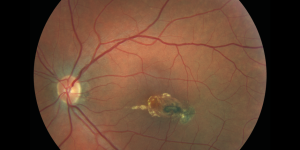Get the right care based on your individual needs.
What is macular degeneration?
Macular degeneration is damage or breakdown of the macula of the eye. The macula is a small area in the back of the eye that allows us to see fine details clearly. When the macula doesn’t function correctly, we experience blurriness or darkness in the center of our vision. Macular degeneration affects both distance and close vision, and can make some activities – like threading a needle or reading – impossible.
Although macular degeneration reduces vision in the central part of the retina, it does not affect the eye’s side, or peripheral vision. For example, you could see the outline of a clock but not be able to tell what time it is.
Macular degeneration alone does not result in total blindness. People continue to have some useful vision and are able to take care of themselves.
What causes macular degeneration?
Many older people develop macular degeneration as part of the body’s natural aging process.
The two most common types of age-related macular degeneration are”dry” (atrophic ) and”wet” (exudative):
“Dry” macular degeneration (atrophic)
Most people have”dry” macular degeneration. It is caused by aging and thinning of the tissues of the macula. Vision loss is usually gradual.
“Wet” macular degeneration (exudative)
“Wet” macular degeneration accounts for about 10% of all cases. It results when abnormal blood vessels form at the back of the eye. These new blood vessels leak fluid or blood and blur central vision. Vision loss may be rapid and severe.
How is macular degeneration treated?
Age-Related Macular Degeneration (AMD): The earliest treatment for AMD was Laser Photocoagulation. Photodynamic Therapy (PDT) laser with Visudyne™ (a drug injected intravenously and used to help direct the laser to the affected area). Visudyne™ therapy involves the use of a specifically-designed laser that produces the low-level, non-thermal light required to activate the drug which results in a selective destruction of the unwanted leaking vessels sealing off leaking vessels while leaving healthy ones intact and, is believed to be a major improvement over previous laser treatments.
Unfortunately, even the most successful treatments do not preclude reoccurrence, making multiple treatments likely. However, the rate of vision loss may be slowed down and some sight may be preserved. It is important to understand that this drug is not a cure. At best it preserves the status quo: It will not restore vision that has already been lost.
In the normal life of the human body, VEGF is a healthy molecule which supports the growth of new blood vessels. In the case of macular health, though, VEGF is unhealthy. It promotes the growth of new, weak blood vessels in the choroid layer behind the retina, and those vessels leak blood, lipids, and serum into the retinal layers. The leakage (hemorrhaging and inflammation) causes scarring in the retina that kills macular cells that allow us to see fine details.
The mainstay of treatments for wet AMD is Anti-VEGF or Anti- vascular endothelial growth factor (AKA: VEGF inhibitors).”
